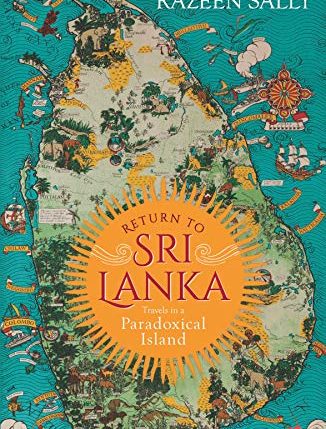
Book review: Return to Sri Lanka by Razeen Sally
Razeen Sally`s RETURN TO SRI LANKA was first published in India by Juggernaut Books; this edition is published by Simon and Schuster Books in 2025. Packed with information delivered in the most dispassionate manner as befits an academic, the book is such a good read.
The product of a Welsh mother and a Lankan Muslim father, Prof Sally returns to Sri Lanka often, each time picking up fresh nuggets he files away, and several such have found their way into this book. This is not an after-war account of the country, or even one that parses the economic collapse, it is a personal travel memoir. For long, SL had become a` bothersome backwater` in his mind. As he grew up, the author discovered a new tolerance, a new sympathy, and with it, the new blossom of empathy.
The book is the result of several roads trip the author took across the island. After a quick potted history of the island from ancient times, Prof Sally makes his points loud and clear. That religious syncretism once characterised religion in SL. That Tamils, Dravidians who trace their ancestry to South India and speak Tamil, have probably inhabited parts of SL, especially the north, for as long as the Sinhalese. How the country was long a favourite, a model colony for the Raj. The genesis of the country`s name: Sri Lanka is Sinhala for `resplendent isle`; Lanka is the ancient term for the island in Hindu epics, and in Sinhala. Ceilao/Ceylan/Ceylon was what the Western colonisers called the island. How coffee was grown but not drunk before the British arrived; it was used to flavour dishes, its flower was given as a temple offering. How SL industrialised through exports; the plantation-economy isle in 1977 exported tea, rubber, coconut but by the mid-90s, garments had become the biggest export earner.
Political turmoil
How caste discrimination played an early role in militancy in SL; there is the account of how V. Prabhakaran, who hailed from a lower caste and was not allowed to use the temple`s front entrance, shot and killed Alfred Duraiappah in 1975 as the SLPF mayor of Jaffna came out of the temple. How during the Rajapaksa years, journalists critical of the government were labelled unpatriotic and accused of undermining the war effort, hounded, disappeared, killed.
This book, in my opinion, is worth the price mainly for its crisp telling of the politics of what Samanth Subramanian called `this divided island` and Prof sally calls a heaven-and-hell country, often convulsed and sometimes consumed buy its own extremes. The author says the road trip showed him the most intense contrasts of scenery, of culture and religion, of wealth and poverty, the pathos of war and its enduring scars…but also the buoyancy of post-war recovery.
Related Links:
Book review: Brotherless Night by V V Ganeshananthan
Book review: The Seven Moons of Maali Almeida by Shehan Karunatilaka
Book review: The Story of a Brief Marriage by Anuk Arudpragasam